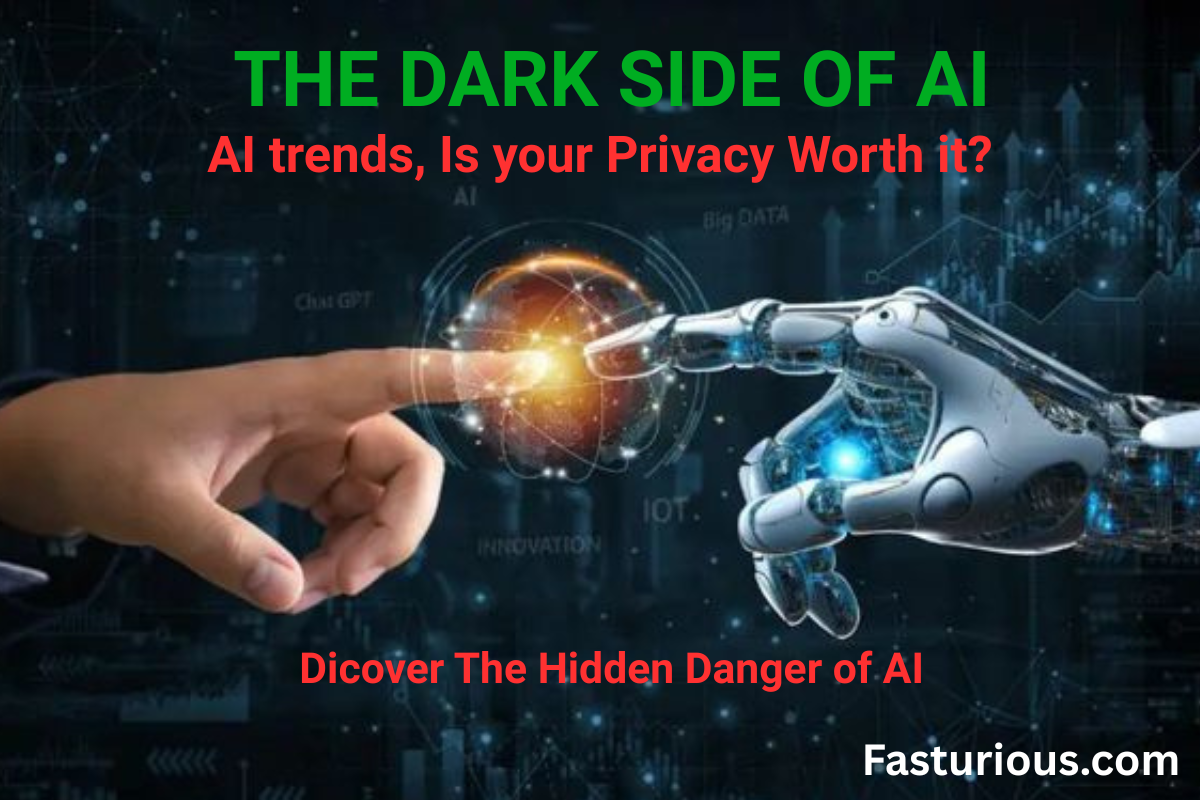Why AI Trends Dominate in 2025
From AI-generated art to viral filters and chatbots, artificial intelligence has become the internet’s favorite toy. Millions of people download these apps daily—sharing photos, voices, and personal details to participate in the latest trends.
But there’s a darker side: the Dark Side of AI Trends raises serious concerns about privacy, ethics, and safety. If left unchecked, AI could reshape society in harmful ways.
👉 Related: 10 Easy Ways to Stay Safe Online in 2025
The Hidden Dangers of Viral AI Apps
Most AI-powered editing tools and filters require access to your photos, microphone, or even contact list. Behind the scenes, your uploads may not only be processed but also stored or sold to third parties.
Examples of Popular AI Apps in 2025:
| App | Why It’s Trending |
|---|---|
| Google Gemini (Nano Banana) | AI outfit changes, pet recreations, stylized remakes |
| Adobe Photoshop + Firefly | Generative Fill, batch editing, text-to-image |
| YouCam AI Pro | Social media–friendly edits, free/freemium |
| Luminar Neo | Desktop photo editing with AI-powered enhancements |
| Canva AI | Templates, AI style filters, quick edits |
While these apps appear harmless, experts warn they could become gateways for data misuse, scams, and dark web leaks.
👉 Learn more: Best AI Tools for Creators in 2025
Misinformation, Deepfakes & AI-Generated Content
One of the most alarming aspects of the Dark Side of AI Trends is the rise of deepfakes and fake content.
- Deepfakes: Fake but realistic AI-generated videos of public figures can mislead millions.
- Fake News: AI can churn out convincing but false stories that spread faster than fact-checking.
- Social Media Bots: Automated accounts can amplify propaganda or fake reviews.

Real Life Example:
Imagine receiving a voice message that sounds exactly like your child begging for ransom money. The emotional manipulation far exceeds that of a phishing email.
On a larger scale, fake videos of politicians could sway elections, as it may take hours before news outlets debunk the footage. By then, millions could be influenced.
Good vs Bad Sides of AI
| Positive Uses of AI | Dark Side of AI Trends |
|---|---|
| Personalized recommendations (Netflix, Spotify) | Manipulative ads & addictive designs |
| Medical image analysis & diagnostics | Privacy risks from health data leaks |
| Self-driving cars & robotics | Job losses in transport & labor sectors |
| Generative art & creativity tools | Deepfakes & misinformation campaigns |
Identity Theft & Dark Web Concerns
The more personal data you share, the easier it becomes for criminals to impersonate you using AI. Deepfakes combined with stolen data can trick family, friends, or even financial institutions.

Cybersecurity experts warn that many AI apps may leak user data onto the dark web, where it can be misused for:
- Fraud & scams
- Identity theft
- Blackmail
Protecting Your Privacy in the AI Era
Here are some practical tips to safeguard your privacy:
- ✅ Be mindful of what you upload.
- ✅ Remove metadata (location, device info) before sharing photos.
- ✅ Avoid sharing intimate or personal content.
- ✅ Use official tools like Google Gemini instead of shady lookalike sites.
- ✅ Stay updated on privacy settings and permissions.
Key Takeaways
- AI has amazing potential but also dark risks.
- Deepfakes and misinformation could undermine democracy.
- AI tools may secretly collect and sell your personal data.
- Responsible use and stronger regulations are urgently needed.
What’s Next? Governments & Responsibility
To truly balance innovation and safety, governments must regulate AI. Policies should address:
- Transparency in AI training data
- Laws around deepfakes & labeling fake content
- Stronger privacy protections
- Preparing workers for AI-driven job displacement
👉 Related: AI and Jobs in 2025 – Who Wins, Who Loses?
Conclusion: AI Must Be Used Responsibly
The Dark Side of AI Trends shows us that while AI is powerful, it’s also risky. From privacy invasions to identity theft, from misinformation to job displacement, the challenges are real.
But with responsible AI use, strong laws, and ethical practices, society can enjoy the benefits of AI without falling victim to its dangers.
AI should serve humanity—not control it.
“AI is neither good nor evil. It’s a tool. The outcome depends on how humanity decides to use it.” – Sundar Pichai, CEO of Google